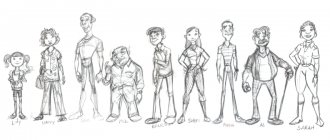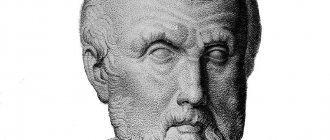| Kind of work: | Essay |
| Date added: | 21.01.2020 |
- This type of work is not a scientific work, it is not a finished final qualifying work!
- This type of work is a finished result of processing, structuring and formatting collected information intended for use as a source of material for independent preparation of educational work.
If you have a hard time understanding this topic, write to me on WhatsApp, we’ll look into your topic, agree on a deadline, and I’ll help you!
If you want to learn how to correctly carry out and write abstracts on any subject, then on the page “what is an abstract and how to do it” I wrote in detail.
Introduction
Character literally translated from Greek means stamping, imprint. In psychology, character is understood as a set of individual mental qualities that manifest themselves in a person under typical conditions and are expressed in his inherent activity in such conditions. Character is interrelated with other aspects of personality, especially temperament and ability. In communicating with people, a person’s character is manifested in how he behaves, how he communicates, how he reacts to the actions and activities of people.
Manifestation of character
The manifestation of character is embedded in the structure of the personality, which is influenced by its positive and negative traits. In the absence of clearly defined character traits, significant changes occur in its structure. A person's moral values and beliefs are the main and determining factor in the formation of character. They contribute to the establishment of a long period of manifestation of individual behavior.
A person’s character has a close relationship with his stable and stable interests. The lack of correct perception of the surrounding world, the lack of self-sufficiency and independence of the individual leads to unstable characteristics of the individual. However, with a person’s stable focus and perseverance, the depth of interests increases noticeably.
To determine the characteristic features of a person, you should pay attention to his attachments and hobbies. It is necessary to analyze the actions a person performs in a variety of situations. The directions of all life activities of the individual and his actions lead to the formation of spiritual and material needs. The complex of characteristic features of a person and his qualities depend on real achievements, and not on the presence of intellectual abilities.
General concept of character
The literal translation from Greek means minting, engraving. In psychology, character is understood as a set of individual mental qualities that manifest themselves in a person under typical conditions and are expressed in his inherent activity in such conditions.
Character is an individual combination of a person’s essential qualities that express his attitude to reality and are manifested in his behavior and actions. Character relates to other aspects of a person, especially their temperament and abilities. Character, like temperament, is quite stable and unchanging. Temperament is the form of manifestation of a character that colors certain of his traits in a unique way.
Thus, in choleric people, stability is expressed in effervescent activity, in phlegmatic people - in concentrated reflection. The choleric person works energetically, passionately, phlegmatically - methodically, not hastily. On the other hand, temperament itself is restored under the influence of character: A person with a strong character can suppress some negative aspects of his temperament in order to control its manifestations.
Abilities are inextricably linked with character. A high level of abilities is associated with such traits as collectivism - a feeling of an inextricable connection with the team, a desire to work for its benefit, faith in its strength and abilities, combined with constant dissatisfaction with its performance, high self-esteem, and the ability to critically evaluate its work. Flourishing skills are associated with the ability to persevere in the face of adversity, persist in the face of setbacks, work in an organized manner, and take initiative.
The connection between character and abilities is also expressed in the fact that the development of such character traits as hard work, initiative, determination, organization, and perseverance occurs in the same activities of the child in which his abilities are formed. For example, work as one of the main activities develops, on the one hand, the ability to work, and on the other, hard work as a characteristic.
When communicating with people, a person’s character is manifested in how he behaves, how he reacts to the actions and actions of people. The mode of communication may be more or less sensitive, tactful or ruthless, polite or impolite. Character, in contrast to temperament, is determined not so much by the characteristics of the nervous system as by a person’s culture and upbringing.
There is a division of human personality traits into motivational and instrumental. Motivation, encouragement, guidance, support and tools give it a certain style. Character can be considered one of the instrumental personal qualities. We are no longer talking about the content, but about the method of carrying out the activity. We admit, as has already been said, character can also be manifested in the choice of the goal of activity. However, when the goal is defined, character plays a more instrumental role, i.e. as a means to achieve a goal.
Let's list the most important personality traits that are part of a person's character.
- Firstly, these are personality traits that determine a person’s actions when choosing an activity goal (more or less complex). Here, rationality, calculation, or their opposite traits may appear as specific character traits.
- Secondly, the structures of character traits that relate to actions aimed at achieving set goals include: perseverance, determination, order and others, as well as an alternative to them (for example, evidence of a lack of character). In this regard, character is close not only to temperament, but also to the will of a person.
- Thirdly, the composition of the character is associated with purely instrumental traits that are directly related to temperament: Extroversion - introversion, calmness - fear, restraint - impulsiveness, mobility - rigidity, etc. A kind of combination of all these character traits in one person can be assigned to a certain type . In the next section we will look at the typology of symbols.
What is character?
Character is a system of relatively constant mental properties that determine the behavior of an individual and the main features of his interaction with the outside world. Character is formed and developed throughout life. It includes many personal qualities, patterns of behavior and habits that are formed under the influence of external and internal factors.
The term "character" is derived from the ancient Greek word χαρακτήρ (read as "character"), which is translated as "special mark", "distinctive feature" or "sign".
The character has two key features:
- character traits are stable if we take into account a short period of time, but they change with the accumulation of knowledge and life experience;
- character determines a person’s entire life, influencing most of his decisions, actions and statements.
The most typical personality traits are manifested in character. Thus, knowing well the character of a certain person, it is possible to predict his behavior in different situations and reaction to certain events with fairly high accuracy.
In psychology, an entire section is devoted to the study of character—characterology. She studies the essence of character and its types, as well as the processes of its formation and development.
Physiological foundations of character
The physiological basis of character is a fusion of features such as higher nervous activity and complex stable systems of temporary connections that have developed as a result of individual life experience. In this fusion, systems of temporary connections play a more important role, since the type of nervous system can form all socially significant characteristics of a person. But, firstly, connective systems are formed differently by representatives of different types of nervous systems, and secondly, depending on the type, these connective systems manifest themselves differently. For example, a characteristic can be put forward as a representative of a strong, excitable type of nervous system and a representative of a weak type. But it will be addressed differently and manifest differently depending on the type.
Typology of the sign
Attempts to create a typology of character have been made repeatedly in the history of psychology. One of the most famous and earliest was the proposal of the German psychiatrist and psychologist E. Krechmer at the beginning of our century. A little later, a similar attempt was made by his American colleague W. Sheldon, and today by I. Fromm, K. Leonhard, A. E. Lichko and a number of other scientists.
All typologies of human characters were based on a set of general ideas.
The most important of them are the following:
- A person’s character is formed quite early in ontogenesis and remains more or less stable throughout life.
- Combinations of personality traits that are part of a person’s character are not random. They form clearly distinguishable types that allow us to identify and build a typology of signs.
- Most people can be divided into groups according to this typology.
E. Kretschmer identified and described the three most common types of structure or constitution of the human body: asthenic, athletic and picnic . He associated each of them with a certain type of sign (later it turned out that the author did not have an adequate scientific basis for this). Asthenic type , according to Krechmer, is characterized by a low body thickness of a flat profile at an average height or higher. An asthenic person is usually a thin and thin person; because of his thinness, he seems a little taller than he actually is. An asthenic person has thin skin of the face and body, narrow shoulders, thin arms, an elongated and flat chest with weak muscles and weak accumulation of fat. This is mainly characteristic of male asthenia. Women of this type are also often undersized.
The athletic type is characterized by a highly developed skeleton and muscles. This type of person is usually medium to large in size, with broad shoulders and a strong chest. He has a thick, big head.
The picnic type is characterized by highly developed internal body cavities (head, chest, abdomen), a tendency to obesity in underdeveloped muscles and the musculoskeletal system. This average man with a short neck sits between the shoulders.
The type of body structure shown by Krechmer and partly confirmed by recent research in the field of psychogenetics, correlates to some extent with a tendency towards mental illness. For example, manic-depressive psychosis most often occurs in people with extremely pronounced pyknic tendencies. Asthenic people and athletes are more prone to schizophrenic diseases. Although Kretschmer's typology was constructed in a speculative manner, it contained a number of important observations.
As a result, it was found that people with a certain type of body structure are prone to diseases that are associated with an emphasis on their respective traits. Later character qualifications were based on descriptions of these accentuations. One of them belongs to the famous home psychiatrist A.E. Lichko. This classification is based on observations of adolescents.
According to Lichko, character accentuation is an excessive amplification of individual character traits, in which deviations in human psychology and behavior are observed, bordering on pathology, which do not go beyond the norm. Such accentuations, as temporary mental states, are most often observed in adolescence and early adolescence. The author of the classification explains this factor as follows: “Under the influence of psychogenic factors aimed at the “place of least resistance,” temporary correctional disorders and behavioral deviations may occur.”
When a child grows up, character traits that manifest themselves in childhood remain quite pronounced and lose their severity, but with age they can reappear significantly (especially during illness).
The influence of character types on professional activity
There are from 10 to 14 character types. They can be harmonious and disharmonious.
Harmonious types are characterized by sufficient development of basic character traits without distinction, isolation, and without exaggeration in the development of certain traits. Disharmonious - manifests itself in the identification of various character traits and is called accentuated or accentuated. In 20-50% of people, some character traits are so sharpened that character distortion occurs, character is emphasized, and as a result of deterioration in interaction with people, similar difficulties and conflicts arise.
The expression of accentuation can be different: from light, which is visible only in close proximity, to extreme options, when you have to think about whether this is a disease - psychopathy. Psychopathy is a painful deformity of character (with the preservation of human intelligence) as a result of abruptly interrupted relationships with other people. But unlike psychopathy, character accentuations do not appear constantly, can be completely smoothed out over the years, and approach the norm. Emphasizing character is more common (50-80%) in adolescents and young men than in adults, since these phases of life are the most critical periods for the formation of character, the presentation of uniqueness, and individuality. Then the accents can be smoothed out or, conversely, strengthened and can turn into neuroses or psychopathy.
We will look at twelve disharmonious (accented) types of characters and describe their positive and negative qualities that can affect a person’s professional activity.
1. Hyperthermic type. It is almost always characterized by a good mood, high tone of life, sparkling energy, and uncontrollable activity. Strives for leadership and adventure. You need to be careful with her unjustified optimism and overestimation of her abilities. Qualities that are attractive to the interlocutor: Energy, drive, initiative, a sense of new things, optimism.
Because people around him do not like: recklessness, a tendency to immoral actions, a frivolous attitude towards the tasks assigned to him, irritability in the circle of close people.
Conflicts are possible during monotonous work, loneliness, under conditions of strict discipline and constant moral teachings. This leads to the person getting into trouble. Such a person has proven himself well in work involving constant communication. These are: organizational activities, consumer services, sports, theater. Typical for blacks is a frequent change of profession and job.
2. Dysthymic type . The opposite of the first type: serious, pessimistic. Constantly in a bad mood, sad, reserved, reserved. These people are attracted to noisy societies where workers do not blend together. They rarely enter into conflicts and are more often the passive party. They are very grateful to people who are friends with them and tend to obey them.
People around them appreciate their seriousness, high morality, honesty and justice. But qualities such as passivity, pessimism, sadness, slow thinking, and separation from the team repel others from getting to know and befriend them.
Conflicts occur in situations that require quick action. Lifestyle changes have negative consequences for these people. These people do good work in professions that do not require a wide range of communication. In unfavorable conditions they are susceptible to neurotic depression. This accentuation is most often found in people with a melancholic temperament.
3. Cycloid type. The characteristic emphasis appears in the cyclically changing periods of ups and downs. During periods of high mood, people experience hyperthymic accentuation, and during periods of low mood, dysthymic accentuation. Problems are exacerbated during recessions. These frequent changes in mental state tire people, make their behavior unpredictable, contradictory, and tend to change professions, places of work, and interests.
4. Excitable type. These people have increased irritability, a tendency to aggression, lack of complexes, gloominess, a desire to please, but perhaps also flattery, helpfulness, a tendency to be rude and use obscene language or silence, and slow speech. They are active and often conflict, do not avoid quarrels with their superiors, are unhappy in the team, despotic and cruel in the family. Besides their temper tantrums, these people are conscientious, careful, and affectionate towards children.
Passers-by do not like their irritability, temperament, inappropriate outbursts of anger and malice, using violence, cruelty, and weakened control over attraction. These people are strongly influenced by physical labor and sports activities. They need to develop endurance and self-control. They change jobs frequently because they lack vitality.
5. Stuck type. People with such an emphasis get stuck on their feelings and thoughts. They cannot forget their grievances and get even with their offenders. They are unwavering in their work and domestic policies and tend to engage in lengthy arguments. In a conflict, they are often an active party and clearly define their circle of friends and enemies. They are in a position of power.
The interlocutors like their desire for high efficiency in any business, the manifestation of high demands on themselves, the thirst for justice, honesty, strong, consistent views. But at the same time, these people have qualities that repel others: Indignation, mistrust, vindictiveness, arrogance, jealousy, ambition. Conflict is possible when self-respect, injustice, or an obstacle to achieving ambitious goals.
6. Pedantic type . These people have a pronounced nerdiness in the form of a sense of detail; when serving, they can torture visitors with formal requirements; at home, they exhaust them with excessive caution.
They are attractive to others because of their conscientiousness, accuracy, seriousness, reliability in business and emotions. But, nevertheless, people have a number of disgusting traits: formalism, chicanery, overwork, the desire to transfer decisions to others.
Conflicts are possible in a situation of personal responsibility for an important matter if its merits are underestimated. They are prone to obsession and psyche. For such people, professions that do not involve much responsibility are preferable to paperwork. They are not inclined to change jobs.
7. Anxious type. People with such an accent are narrow-minded, fearful, anxious, and unsure of themselves. They are constantly afraid for themselves, for their loved ones, have many years of experience of failure and doubt the correctness of their actions. They rarely enter into conflict and play a passive role.
Conflicts are possible in situations of fear, threats, ridicule, and unfair accusations. People around them appreciate their kindness, self-criticism and hard work. But fearfulness and shame sometimes become the target of jokes. Such people cannot be leaders who make responsible decisions, because they are characterized by endless experience and attention.
8. Emotive type. This type of person is overly sensitive, vulnerable and deeply anxious. He is sensitive to observations and failures, so he is usually in a sad mood. He prefers a close circle of friends and relatives who would understand him perfectly.
He rarely gets involved in conflict and plays a passive role. Crimes do not dissipate, but rather remain. Those around him like his compassion, pity, and expression of joy towards the happiness of other people. He is very content and has a high sense of duty.
He is usually a good family man. But extreme sensitivity and tearfulness repel others.
He tragically accepts conflicts with a loved one, death or illness. Injustice, rudeness, and being surrounded by rude people are contraindicated for him. He achieves the most significant results in the field of art, medicine, raising children, caring for animals and plants.
9. Demonstrative type. This person tries to be the center of attention and achieve his goals at any cost: tears, impotence, scandals, illnesses, boasting, outfits, unusual hobbies, lies. He easily forgets his infamous actions. He is highly adaptable to people.
This person is attractive to other people due to his politeness, persistence, determination, acting talent, ability to attract others, and also his unusualness. He has qualities that push people away from him, and they contribute to conflicts: selfishness, unrestrained actions, deception, boasting, a tendency to intrigue, shirking from work. A conflict with such a person arises when his interests are violated, when his merits are underestimated, when his pedestal is thrown off. Such situations cause him to have a hysterical reaction.
10. Exalted type. People with such an accent have very unstable moods, speech, and increased distraction from external events. Their emotions are clearly expressed and reflected in love.
Such qualities as altruism, artistic taste, artistic talent, radiant feelings and love for friends are appreciated by interlocutors. But exaggerated impression, pathos, panic and despair are not their best qualities. Failures and sad events are perceived as tragic and tend to cause neurotic depression.
Their existential environment is the sphere of art, artistic sports, and professions associated with closeness to nature.
11. Introverted type . People with such an accent are characterized by low sociability and isolation. They stay away from everyone and interact with other people only when necessary, usually going deep into themselves and their thoughts. They tend to be more vulnerable but don't talk about themselves or share their experiences. Even their relatives are treated coldly and reservedly. Their behavior and logic are often incomprehensible to others.
These people love solitude and prefer to be alone rather than in a noisy company. They rarely come into conflict, only when they try to penetrate their inner world.
They are demanding in choosing a spouse and strive to find their ideal. They have strong emotional coldness and weak connections with loved ones.
The people around them are like them for their restraint, degree, prudence, strong convictions and honesty. But stubbornly defending their unrealistic interests, views and having their point of view, which is very different from the point of view of the majority, pushes people away from them.
Such people prefer work that does not require a large social circle. They are prone to theoretical sciences, philosophical reflections, collecting, chess, fiction, and music.
12. Conformal type. People of this type are highly sociable and have a chatty eloquence. They usually don't have an opinion and don't try to stand out from the crowd. These people are not organized and tend to obey others. Less strong leadership than others when dealing with friends and family. Surrounded by these people, like their willingness to listen to others, diligence. But at the same time, these people, who do not mean the king, are influenced by others. They do not think about their actions and get carried away with entertainment. Conflicts are possible in situations of forced loneliness and lack of control.
These people can easily adapt to new jobs and perform their tasks well if the tasks and rules of behavior are clearly defined.
How is character formed?
Erich Fromm wrote in one of his works: “The character of a child is a copy of the characters of his parents.” Thus, the main factors in character formation are genetic background and the personal influence of the child’s parents or guardians. In the future, the development of character is influenced by everyone with whom the person comes into contact: educators and classmates, friends and lovers, work colleagues and strangers with authority.
Throughout life, character is influenced by temperament, which determines a person’s reaction to current events (we will look at how temperament influences character below). Therefore, some people become sociable, responsible and decisive, while others lack these character traits.
Different character traits are formed at different periods of life:
- Primary features. This part of the character is formed in early childhood (usually from 2-3 to 7-9 years).
- Social traits. This part is formed mainly at school age - between 7 and 14 years. During this period, children learn the intricacies of social interaction through contact with relatives, classmates, friends and teachers.
- Strong-willed traits. The formation of will and discipline occurs between the ages of 14 and 18. In adolescence, a person is constantly faced with a choice between correct and desired actions, and is aware of the consequences and cost of decisions made.
- Basic features. This is an extensive group of character traits that form, develop and change throughout life. It includes curiosity, sociability, responsiveness, morality, the ability to compassion and other traits that determine a person’s interaction with society and the outside world.
By adulthood, character is usually formed and consolidated. After that, it continues to change, but much more slowly. This mainly occurs under the influence of factors such as:
- example from loved ones and simply significant people;
- other people's opinion, approval and condemnation;
- culture (literature, films and other works);
- moral standards, religion and ideology of society.
In recent years, the Internet has become one of the most important factors influencing the character of people of all age categories. On the Internet, people get acquainted with cultural works, watch videos and play games. But the main factor is still communication. Internet users get the opportunity to communicate with a large number of different people (including foreigners), participate in discussions, and join different communities.
It is believed that a modern person becomes a mature personality with a fully formed character around the age of 30. By this age, the basic character traits necessary to achieve professional success and start a family are consolidated. Of course, many people become successful and start families earlier. But at the age of 30, a person develops such fundamental traits as determination, discipline, responsibility and endurance.











